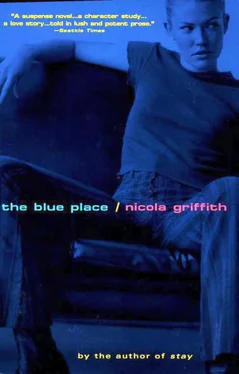I looked at my hands, turned them over in the tarnished shine of streetlights seeping through a crack in the curtains. They were long; strong and competent with nicely shaped nails; hard enough for a palm strike, soft enough to trace gentle arabesques on a taut trembling stomach or along a soft inner thigh. The stains did not show.
I woke up just after dawn, lying on my side, with a greasy headache and a craving for eggs and the bite of grapefruit juice. She scootched up behind me, tucked her belly against my back and ran a hand up my thighs. I stopped thinking about eggs. This time it was simpler, more straightforward, with grins on both sides. Angst was for the dark.
She moved away from me then, and I understood she was done: it was six-thirty, time to resume her job-seeking mask of brisk, detached efficiency. After I showered I was not surprised to find her encased in a business suit and hiding behind impersonal makeup. She didn’t have time for breakfast, but I was to feel free to use her room number in the hotel dining room. I thanked her politely, we nodded instead of touching, and I left.
The corridor to the elevators was long. I wondered why Atlanta hotels kept their public spaces so cold.
The Saab still smelled faintly of her perfume and the after-club effluvia of smoke and beer, and I told myself I was a fool. I drove back to Lake Claire very fast, with all the windows open, and found when I returned that the clocks were blinking 88:88—there had been a power hit in the middle of the night. The thunderstorm, no doubt.
I gave the homeless man in front of the Marquis Tower Two a dollar bill that was nearly whipped away in a gust of warm April wind, and went into the lobby which was all black marble and chrome. A very good, hidden sound system played Satie. The piano notes glided around the hard walls and polished floor, warming and humanizing the space, but not enough.
Thirty-four floors up, I headed towards the Lyon Art suite, expecting more sleek surfaces, with perhaps some uncomfortable furniture and elegant but indifferent staff. Instead the door swung open to laughter, bright colours and the earthy, welcoming scent of French roast. The woman who was laughing—comfortably plump, about sixty—turned at my entrance, scooted her chair under the beautiful pine reception desk, and smiled. “Good morning. How can we help you?”
The four or five people in the cubicles to the left were on the phone or tapping away at their keyboards. I smiled back. “Aud Torvingen. I have an appointment to see Julia Lyons-Bennet.”
She frowned. “Oh. She said…Didn’t she call you? I distinctly remember her telling me she was going to call you last night.” She swung her chair around again and called to a man who was munching a cinnamon bun by his computer. “Ricky, tell me I’m not losing my mind. Yesterday afternoon, when Julia got that message from InterCom, she said she was going to call Ms. Torvingen?”
“Sure did.”
She turned back to face me. “Well, somebody got their wires crossed. Julia’s not here. She had to go to Boston yesterday. She said she would call you and let you know last night.”
I remembered the storm battering the hotel window.
“I apologize on her behalf. I hope you haven’t been too inconvenienced. I know she particularly wanted to talk to you.”
Her look of genuine distress made me want to reassure her. “I think I know what happened. She probably left a message but I had a power hit last night. I bet the machine reset itself, and when I got in, there was no blinking light so I thought there was no message. No one’s fault.”
“I get so tired of the power company, don’t you? Every time there’s a storm, phht , the power goes. Still, at this time of year it’s not so bad. But when it goes in August, I just go crazy without my air-conditioning. The heat!”
“I know what you mean. When is she expected back from Boston?”
She looked surprised. “This morning. Didn’t I say? No, I don’t suppose I did.”
“Well, perhaps you could ask her to call me.” I reached for one of my not-very-informative cards.
“Oh, heavens, keep that. She’s got your number. Besides, there’s no need for you to rush off. Her plane lands in”—quick glance at her watch—“less than an hour and I’ll page her to make sure she’ll come straight here. Do you take sugar? In your coffee,” she added kindly.
“No. Thank you.”
She started bustling about. “How about cream? Yes? I wish I could get Julia to take some cream. Nothing but skin and bone. I tell her she could do with some padding, no one dates skinny girls, but she just gives me that look.” She handed me the coffee, directed a piercing look at my ringless left hand, and nodded to herself. “Dating can be hard for career women.”
I thought about Mindy, probably already smiling efficiently at her prospective employer.
She gave me a sly smile. “Well, come along, let’s go see if we can find that file she wanted you to see.”
I followed her past Ricky, who flashed me a sympathetic look, behind the cubicles and past a large room full of strange crates and bags of foam peanuts, into what I took to be Julia’s office. “Here we go.” She held out a maroon folder. I hadn’t seen where she had taken it from. “Well, don’t just stand there like a lamppost. Sit, sit.” I allowed myself to be chivvied into a comfortable chair. “You read that and drink your coffee and I’m sure it won’t feel like a minute before Julia gets here.”
I felt like a seven-year-old being comforted by a friend’s mother, but managed to regain my poise enough to smile and say, “I’m afraid I don’t know your name.”
She gave me a roguish twinkle, said “Mrs. Miclasz, but you should call me Annie,” and closed the door behind her.
I sipped the coffee. It was delicious, perfectly prepared, as I imagine anything prepared by Annie Miclasz would be. One of those formidable women who felt they had to hide their efficiency behind a soft, caring front; who hid for so long that the front became real; one of the women who kept the world turning; one of the women it paid to never, ever cross.
The office was large, and obviously made for use rather than show. Two large drafting tables, one with sheets clipped down; a computer; four filing cabinets; three different Rolodexes; rough iron statuary in the corner near a huge picture window; two lush green plants that I couldn’t identify; and lamps everywhere, mostly unlit. I had expected art on the walls, but they were covered with graphs and charts. No doubt the view of the city at night would be more than fair compensation.
I opened the folder. Fastened to one side were scrupulous records of billable hours (I lifted an eyebrow at her rates); phone calls; packing materials; special transport; estimated costs of airport tax; a list of security measures to be engaged to and from Atlanta and Orly—all subcontracted; a muddy Polaroid of a strangely angular picture of what looked like a ship crushed between ice floes, with Caspar David Friedrich, 39 x 51, oil pencilled on the bottom….
I mused on the relative value of things. The homeless man outside begging for dimes. Thousands of dollars to ship a single piece of canvas that was not even big enough to shelter a person from the wind and rain.
I looked at the photograph again. The pencilled writing was angular, too; that of a Lyons-Bennet more than a Miclasz, I decided. The items attached to the other side of the folder were more interesting: partly typed, partly handwritten memos detailing phone calls between Lyons-Bennet and the banker, one Michael Honeycutt; between Lyons-Bennet and James D. Lusk, Ph.D., ASA, ISA; between Lyons-Bennet and Paulette Ciccione, who turned out to be the insurance adjuster.
Читать дальше












